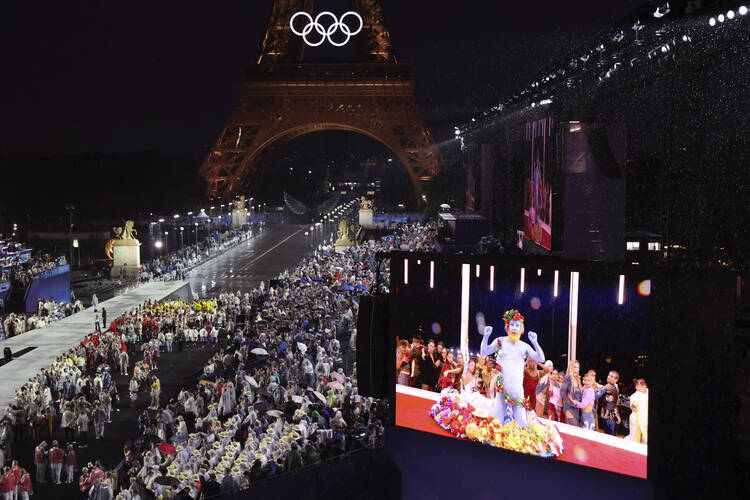I missed out on the latest outrage to Christian sensibilities over the weekend when a drag tableau allegedly aping Leonardo Da Vinci’s “The Last Supper” somehow was included in the Paris Olympics Opening Ceremony. I tried to revisit the scene of this cultural crime, but it appears to have been thoroughly scrubbed from the official video record (and—remarkably—the NBC replay of the opening ceremony). But from what I can gather according to still shots circulating widely across the pundit-verse, Christians, Greek pagans and Smurfs alike have cause to be offended by this senseless act of inclusion.
Christians worldwide quickly took to 24-hour-news chat shows and YouTube channels, part of a pattern of umbrage-seeking that has become the familiar follow-through to such provocations. Some U.S. Christians in particular have come to seem almost gleeful when such opportunities for cultural warriorism land in their laps—just as some snarky secularists delight in the all-too-easy goading of their Christian neighbors.
It is a small irony that Thomas Jolly, the aptly named French cultural curator who put the scene on the Seine together, is at least partly able to indulge in his celebration of diversity (absent religious diversity of course) because generations ago Europeans compelled by their Christian understanding of human dignity and solidarity baked that liberty into the founding principles of the European community. Both contemporary Christians and secular dead-enders, of course, get to express their outrage and derision within the safe confines of a diminished Christendom where freedom of expression is tolerated and protected.
The half-hearted “sorry if people were offended” apologies and rationales offered by Olympic officials and Mr. Jolly have been Olympian exercises in gaslighting, so I have a degree of sympathy for Christians everywhere who hastened to the social media ramparts this week. I do find myself wishing, however, that the Christian community reserved some of that righteousness for more legitimate experiences of Christian persecution.
Aid to the Church in Need reports that globally, 646 million Christians live in nations where religious freedom is not respected. And, according to Open Doors USA, just under 5,000 Christians were killed because of their faith in 2023. Eighty-two percent of those deaths occurred in just one nation—Nigeria, which has become the most dangerous place to be Christian in the world.
Despite that fact, in 2021, Nigeria was removed from the U.S. State Department’s list of countries of particular concern because of religious persecution. If U.S. Christians want to indulge their persecution complexes, that is a matter to actually get—and remain—outraged about. Restoring Nigeria to the State Department list is an issue U.S. Christians can rally around, creating pressure that could actually press the Biden administration to reconsider its decision.
In Myanmar, Christian villages and churches have been targeted in an ongoing campaign of political and ethnic suppression that has followed the general’s coup in 2021. And in September, Pope Francis will visit Indonesia, surely an opportunity to defend the rights and viability of Indonesia’s minority Christian community—and one worth reserving some of the indignation squandered this week on Seine-ic revelries.
There are of course plenty of other nations where religious persecution—from imprisonment and job discrimination to death sentences under predatory blasphemy laws—is an everyday reality and regions like the Caucusus, the Holy Land and Nineveh province in Iraq, where after 20 centuries Christian life is on the verge of extinction. Structural persecution of faith communities around the world and rising government restrictions on religious expression are real, not internet, outrages that do not consistently receive the public attention and geopolitical pressure they warrant.
Da Vinci has survived Dan Brown; I’m confident he will likewise weather this attempt at—what, subversive theater? In a world where Drag Queen Story Hour is already a thing?
The “small world after all” optimism of the Olympics is a hopeful global vision worth defending, but it is not an accurate depiction of the world we all know. In Pakistan, China, North Korea and scores of other nations, there are plenty of reasons to be outraged when it comes to real, not tongue-in-cheek persecution of Christians. We should attend to those outrages and pass up the offenses that get prioritized on Tik Tok, Instagram and other social media anger-generators.
Let’s protect the global strategic outrage reserve for those issues and moments that can lead to actual mitigation of real suffering.








